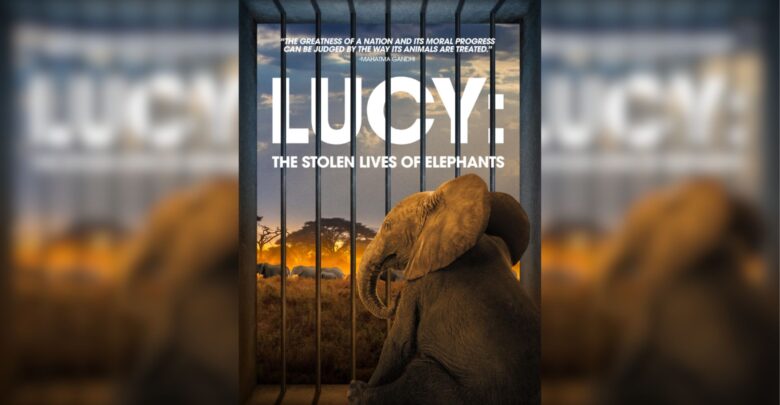‘Lucy’: Interview with LEAP founder, Mary-Ann Holm
Animal activist and LEAP president Mary-Ann Holm speaks about Lucy the Elephant and the Edmonton Valley Zoo following the premiere of Lucy: The Stolen Lives of Elephants.
 Supplied
SuppliedIn March 2025 the documentary Lucy: The Stolen Lives of Elephants premiered at Edmonton’s Metro Cinema. On April 7, 2025, the documentary became available for Canadians on CBCGem with future plans for an international streaming release.
Directed by Fern Levitt, the documentary investigates the issues of elephants living in captivity. It features Edmonton’s Lucy the Elephant and advocacy by the organization Lucy’s Edmonton Advocates’ Project (LEAP).
On April 8 The Gateway spoke with Mary-Ann Holm, the co-founder and president of LEAP.
“I would say that Lucy lives in amongst the worst conditions of any elephant in North America,” Holm said. She spoke about Edmonton’s cold climate and the unsuitably small concrete barn Lucy lives in. “Lucy only goes outside if she’s been allowed to go outside. And when it’s really cold in the winter, sometimes she doesn’t get out of that tiny cell for weeks.”
The organization, In Defense of Animals, listed the Edmonton Valley Zoo as one of the worst zoos for elephants on the continent. “And that’s something we as Edmontonians, Albertans, and Canadians should all be very ashamed of.”
Holm described the toll that captivity has had on Lucy, such as foot disease and dental issues. “Her teeth are malformed and have a variety of cavity type situations because she’s not eating what an elephant normally eats,” Holm said. “In the wild, elephants would eat up to 60 different species of fruits and roots and plants. Lucy’s primary diet consists of hay and some sort of kibble, like one would feed their dog.”
“To be left alone all these years is probably the single most heartbreaking and damaging thing for this elephant,” Holm says
Holm spoke of Lucy’s social isolation. She explained how elephants typically live in large, matriarchal herds from the time they’re babies until they eventually pass. “Lucy was taken from that when she was a baby. She was captured and taken away from her herd. And to be left alone all these years is probably the single most heartbreaking and damaging thing for this elephant.”
“What’s really frustrating is the Edmonton Valley Zoo will claim that Lucy’s keepers are her herd. And that is just arrogant to think that we as humans can replace her species.”
Holm volunteered at an elephant sanctuary and said sanctuaries are skilled at integrating elephants who have either lived alone or with other elephants into new herds.
“They do it by following the elephant’s cues,” Holm said. “So if Lucy was a bit unsure, she wouldn’t be forced into a herd. She wouldn’t be forced to do anything. They would let her do things at her own pace, at her own time.”
When asked about concerns that Lucy wouldn’t survive the transport to sanctuary, Holm explained elephants are relocated globally. She explained that sanctuaries make efforts to ensure the animal is comfortable with the transport crate before travelling. And that it takes weeks for them to prepare an elephant to go on transport.
During the actual transport, veterinarians would travel with Lucy. LEAP has suggested that Lucy’s zookeeper staff could also travel with her.
“Sanctuaries have never lost an elephant in transport. And there’s no reason to think Lucy couldn’t make it.” In 2023, an expert recommended Lucy be moved to a sanctuary in the United States. Two other experts concluded she was not fit to travel.
“I think people who are skeptical might change their viewpoint when they watch the film,” Holm says
If Edmontonians want to support Lucy, Holm said they can reach out to their city councillor as city council has the authority to vote on whether Lucy can be relocated. Citizens can request meetings with their city councillor and Holm mentioned that LEAP would be willing to accompany people to meetings with councillors to advocate for Lucy.
Other ways people could help is by following or joining LEAP on Facebook. Additionally, on the LEAP website are automated letters and petitions for people to send and sign. Other ways to help are also talking to people and encouraging people to watch the film.
“I think people who are skeptical might change their viewpoint when they watch the film and listen to former zookeepers talking about the cruel ways they used to train elephants when they worked in zoos.”
The film shows the cruel ways elephants are taught to do tricks. For example the film shows American trainers training an elephant to stand on their two hind legs by beating their front legs with a bullhook.
Holm mentioned that Lucy was also made to do tricks by the Valley Zoo. But, now that Lucy is retired she doesn’t do performances anymore and the public are no longer allowed inside her barn. “She doesn’t do those performances anymore … but that’s not out of the goodness of [the Valley Zoo’s] heart. This is their ploy to convince people that she’s retired. But they will take her out and walk her around the zoo and [have the zookeepers bring people over to see her].”
Holm said more voices are needed for Lucy. “She needs our voices, not just mine. Because clearly my voice hasn’t done it. She’s still here. We need everybody’s voice to speak out for this elephant.” Holm concluded the interview by mentioning that LEAP would have a demonstration for Lucy on May 31 and encouraged people to come out. The details can be found on Facebook or the LEAP website.




